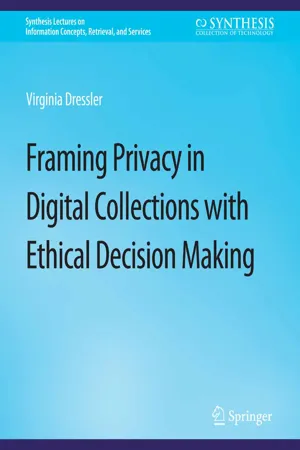
- English
- PDF
- Available on iOS & Android
Framing Privacy in Digital Collections with Ethical Decision Making
About This Book
As digital collections continue to grow, the underlying technologies to serve up content also continue to expand and develop. As such, new challenges are presented which continue to test ethical ideologies in everyday environs of the practitioner. There are currently no solid guidelines or overarching codes of ethics to address such issues. The digitization of modern archival collections, in particular, presents interesting conundrums when factors of privacy are weighed and reviewed in both small and mass digitization initiatives. Ethical decision making needs to be present at the onset of project planning in digital projects of all sizes, and we also need to identify the role and responsibility of the practitioner to make more virtuous decisions on behalf of those with no voice or awareness of potential privacy breaches.
In this book, notions of what constitutes private information are discussed, as is the potential presence of such information in both analog and digital collections. This book lays groundwork to introduce the topic of privacy within digital collections by providing some examples from documented real-world scenarios and making recommendations for future research.
A discussion of the notion privacy as concept will be included, as well as some historical perspective (with perhaps one the most cited work on this topic, for example, Warren and Brandeis' "Right to Privacy, " 1890). Concepts from the The Right to Be Forgotten case in 2014 ( Google Spain SL, Google Inc. v Agencia Españla de Protección de Datos, Mario Costeja González ) are discussed as to how some lessons may be drawn from the response in Europe and also how European data privacy laws have been applied. The European ideologies are contrasted with the Right to Free Speech in the First Amendment in the U.S., highlighting the complexities in setting guidelines and practices revolving around privacy issues when applied to real life scenarios. Two ethical theories are explored: Consequentialism and Deontological. Finally, ethical decision making models will also be applied to our framework of digital collections. Three case studies are presented to illustrate how privacy can be defined within digital collections in some real-world examples.
Frequently asked questions
Information
Table of contents
- Cover
- Copyright Page
- Title Page
- Contents
- Preface
- Acknowledgments
- Introduction
- Framing Privacy within Digital Collections
- Core Ethical Theories and Decision making Frameworks
- Role of the Practitioner as Active Agent, and Notions of Privacy in Digital Collections
- Core Values and Considerations for the Practitioner
- Appendix
- Bibliography
- Author Biography